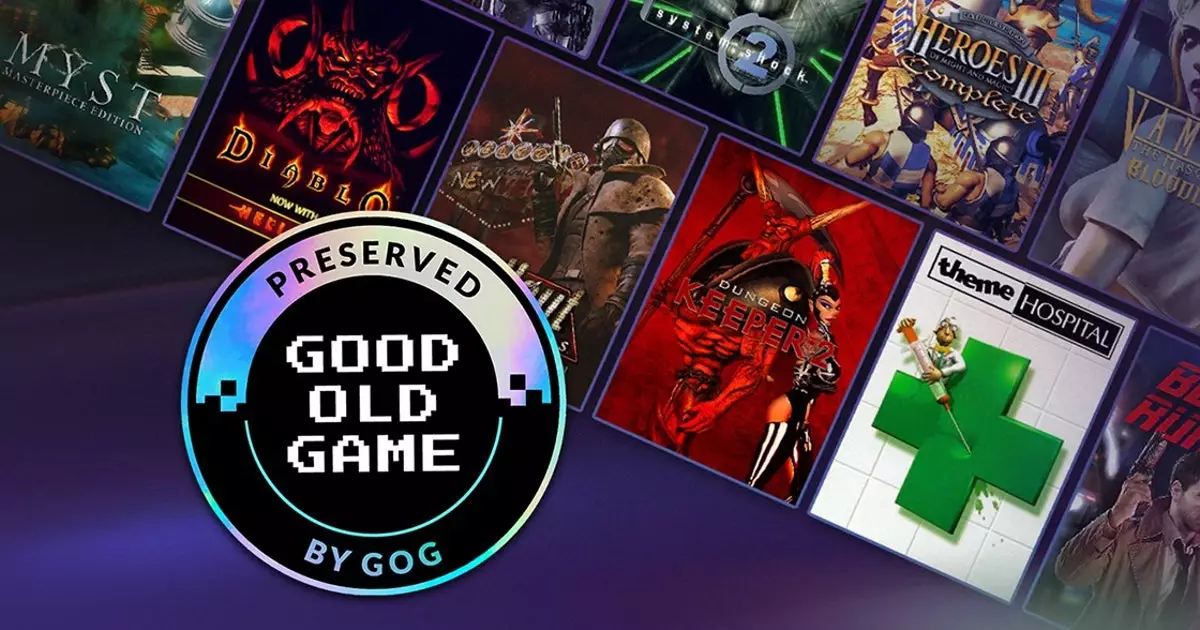In the realm of digital gaming, GOG (formerly known as Good Old Games) has been a hallmark of classic game preservation. Over the years, GOG’s mission has seen a significant shift—from being a sanctuary for nostalgic gamers seeking to relive the vintage experiences of yesteryear to embracing contemporary titans of the gaming landscape. This transition raises critical discussions about the essence of game preservation and the responsibilities of retailers in the digital age. GOG is now delicately balancing the scale between preserving cherished memories and monetizing them alongside modern blockbuster titles.
Amid this evolving landscape, GOG has recently launched the GOG Preservation Program, which signifies a return to its foundational ethos of safeguarding older games. This initiative aims to rejuvenate classic titles for modern systems, addressing the critical compatibility issues that often plague older games. Users can expect a new certification process ensuring that these revitalized games will run smoothly on modern hardware without requiring extensive unofficial modifications. This updated approach is akin to Valve’s Steam Deck Verified system, which ensures that gamers can seamlessly enjoy titles on the handheld device—combining nostalgia with accessibility.
The first wave of classic titles scheduled for re-release includes timeless gems such as the Resident Evil trilogy, System Shock 2, and the original Diablo. With over 100 games slated for this restoration effort, players can celebrate the revival of beloved franchises while enjoying the peace of mind that comes with the “Good Old Game” badge, denoting a title’s readiness for contemporary play.
GOG’s commitment to enriching these games goes beyond just bug fixes. The emphasis on delivering the “most complete version available” signifies a dedication to user experience, promising bundled DLCs, expansions, and additional languages. Players can anticipate offline installers, thereby allowing enjoyment of these titles without the constraints often imposed by digital rights management (DRM). Such moves cater to a growing segment of the gaming community that prioritizes access and usability—especially against the backdrop of increasing frustrations with online servers and digital dependencies inherent in many modern titles.
The undertaking of this project, however, is not without its obstacles. Permission must be secured from original developers or publishers before delving into games’ code. In a digital landscape where companies heavily guard their intellectual property, navigating these permissions can prove challenging. Despite the hurdles, GOG maintains a hopeful outlook, expressing a desire to include a spectrum of games, both recent and classic, in their preservation efforts.
Interestingly, while GOG seeks to implement this preservation initiative, it’s crucial to consider the commercial aspect of this venture. The reality is that GOG operates as a business; thus, the challenge lies in balancing the altruistic idea of game preservation with the necessity of generating profit. While players often yearn for the nostalgia of classical titles, it is the financial returns that may ultimately dictate which titles are revitalized. This raises a larger question: can true preservation coexist with commercial viability in the competitive gaming market?
Moreover, as more players express dissatisfaction over the limited accessibility to their formerly beloved games—often rendered unplayable due to server shutdowns—GOG’s timing for this initiative seems pertinent. The preservation program could serve as a retaliatory measure against growing discontent within the gaming community, clarifying GOG’s role as a protector of gaming heritage. It emphasizes the importance of maintaining a healthy preservation pipeline, which can ensure that classic games remain playable for future generations.
GOG’s renewed focus on game preservation through the GOG Preservation Program is a bold step that resonates with a community deeply invested in the cultural significance of video games. By bridging the gap between nostalgia and modern gaming, GOG not only fortifies its identity but also promotes the importance of preserving gaming history for posterity. While complexities loom on the horizon, the initiative provides a glimmer of hope for fidelity to the roots of gaming amidst burgeoning commercial pressures. If GOG can successfully navigate these waters, perhaps they will not just serve gamers today but also carve a path for the memories of tomorrow.

